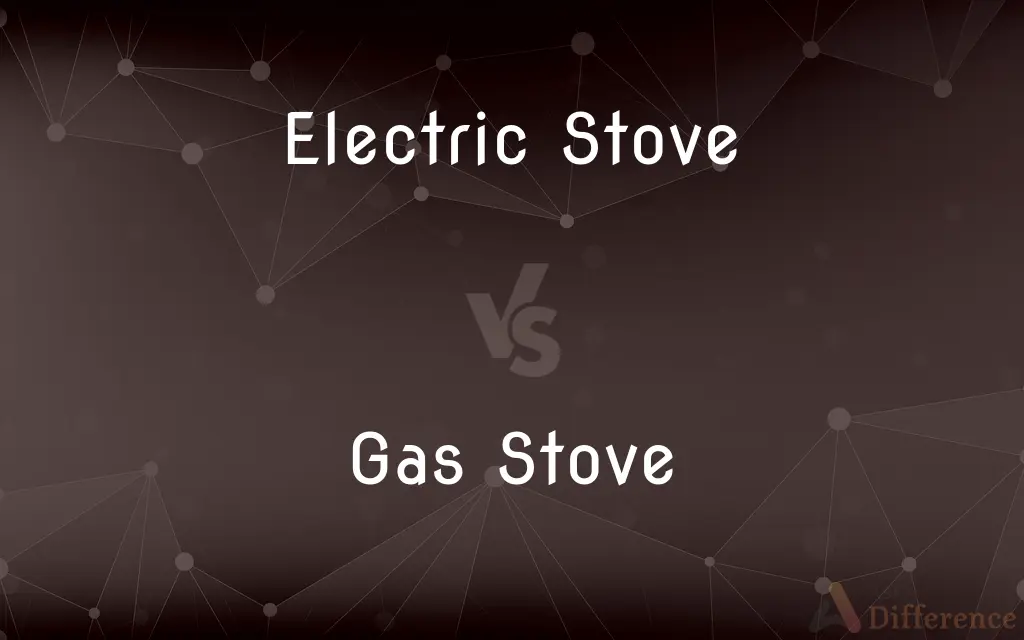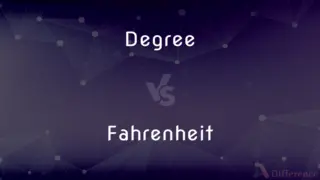Electric Stove vs. Gas Stove — What's the Difference?
Edited by Tayyaba Rehman — By Fiza Rafique — Published on November 5, 2023
Electric stoves use electrical resistance to heat, while gas stoves burn natural gas or propane for cooking.

Difference Between Electric Stove and Gas Stove
Table of Contents
ADVERTISEMENT
Key Differences
An electric stove is a cooking appliance that uses electrical resistance to produce heat for cooking. Gas stoves, on the other hand, utilize the combustion of natural gas or propane to generate the necessary heat.
Electric stoves often come with a flat ceramic or coil surface, making them sleek and easier to clean. In contrast, gas stoves typically feature raised burners and grates, which can require more detailed cleaning.
When an electric stove is turned on, electricity heats the coils or elements, which then radiate heat to cook food. In a gas stove, igniting the gas produces a flame that directly heats pots and pans.
Electric stoves might take a bit longer to heat up compared to gas stoves, but they can provide an even cooking temperature. Gas stoves heat up quickly and allow for instant flame adjustments.
From a cost perspective, electric stoves might have a higher upfront cost but can be less expensive in terms of energy consumption in areas where electricity is cheaper. Gas stoves, while potentially cheaper initially, might cost more over time if gas prices are high.
ADVERTISEMENT
Comparison Chart
Heat Source
Electrical resistance
Natural gas or propane flame
Appearance
Flat ceramic or coil surface
Raised burners with grates
Heat Up Time
Slower heat up
Quick heat up
Temperature Control
Consistent and even
Instant flame adjustments
Cost Over Time
Potentially cheaper energy
Might cost more with high gas prices
Compare with Definitions
Electric Stove
An electric stove doesn't require a gas line or propane tank.
We chose an electric stove because our apartment doesn't have a gas connection.
Gas Stove
A gas stove uses combustion of gas to generate heat for cooking.
She loves using her gas stove for quick stir-fries.
Electric Stove
An electric stove might feature digital controls and displays.
The digital timer on my electric stove is very convenient.
Gas Stove
A gas stove offers immediate temperature control via flame adjustments.
She turned down the flame on the gas stove to prevent the soup from boiling over.
Electric Stove
An electric stove is a kitchen appliance that uses electricity to produce heat.
I cooked dinner on the electric stove tonight.
Gas Stove
A gas stove requires a connection to a natural gas line or propane tank.
We had to install a new gas line for the gas stove in our kitchen.
Electric Stove
An electric stove can have coil or flat ceramic burners.
The flat burners on my electric stove make it easy to clean.
Gas Stove
A gas stove might have a pilot light or electronic ignition system.
The electronic ignition on my gas stove makes it easy to light the burners.
Electric Stove
An electric stove often provides even cooking temperatures.
I prefer baking in the electric stove due to its consistent heat.
Gas Stove
A gas stove features raised burners with visible flames.
I had to adjust the flame on the gas stove to simmer the sauce.
Common Curiosities
What is the primary source of heat for an electric stove?
Electric stoves use electrical resistance for heat.
How does a gas stove produce heat?
Gas stoves burn natural gas or propane.
Is an electric stove usually faster or slower to heat up compared to gas?
Electric stoves typically take longer to heat up compared to gas stoves.
Which type of stove might be easier to clean: electric or gas?
Electric stoves, especially those with a flat ceramic top, are often easier to clean.
How do electric stoves provide even cooking temperatures?
They maintain consistent electrical resistance which radiates even heat.
Which stove type might have a flatter surface: electric or gas?
Electric stoves often have a flat ceramic or coil surface.
Do gas stoves provide instant heat adjustments?
Yes, gas stoves allow for immediate flame adjustments.
Do electric stoves require a gas connection?
No, electric stoves use electricity and don't require a gas connection.
What kind of burners does a gas stove usually have?
Gas stoves typically have raised burners with grates.
What's a notable feature in modern electric stoves?
Many modern electric stoves have digital controls and displays.
Can gas stoves work during power outages?
Yes, gas stoves can operate without electricity, though electronic ignitions might not work.
What's a drawback of using a gas stove in terms of air quality?
Gas stoves can release combustion by-products into the indoor air, which might impact air quality.
Are electric stoves safer than gas stoves?
Both have safety considerations. Electric stoves don't have open flames but can stay hot longer. Gas stoves have open flames but cool down faster.
Do gas stoves offer better temperature control for chefs?
Many chefs prefer gas stoves for their instant flame adjustments and direct heat control.
Which might be more energy-efficient: electric or gas stove?
It varies based on regional energy prices, but electric stoves can be more efficient in areas with cheaper electricity.
Share Your Discovery

Previous Comparison
Black Body vs. Grey Body
Next Comparison
Walmart vs. Walmart SupercenterAuthor Spotlight
Written by
Fiza RafiqueFiza Rafique is a skilled content writer at AskDifference.com, where she meticulously refines and enhances written pieces. Drawing from her vast editorial expertise, Fiza ensures clarity, accuracy, and precision in every article. Passionate about language, she continually seeks to elevate the quality of content for readers worldwide.
Edited by
Tayyaba RehmanTayyaba Rehman is a distinguished writer, currently serving as a primary contributor to askdifference.com. As a researcher in semantics and etymology, Tayyaba's passion for the complexity of languages and their distinctions has found a perfect home on the platform. Tayyaba delves into the intricacies of language, distinguishing between commonly confused words and phrases, thereby providing clarity for readers worldwide.
















































